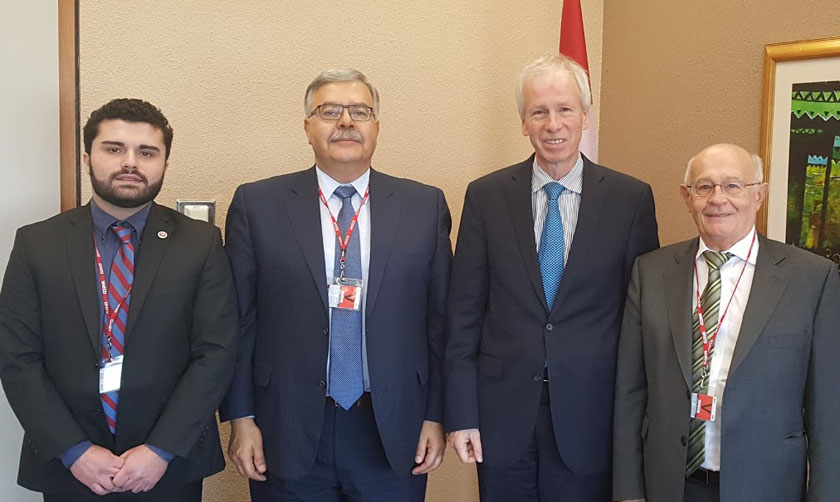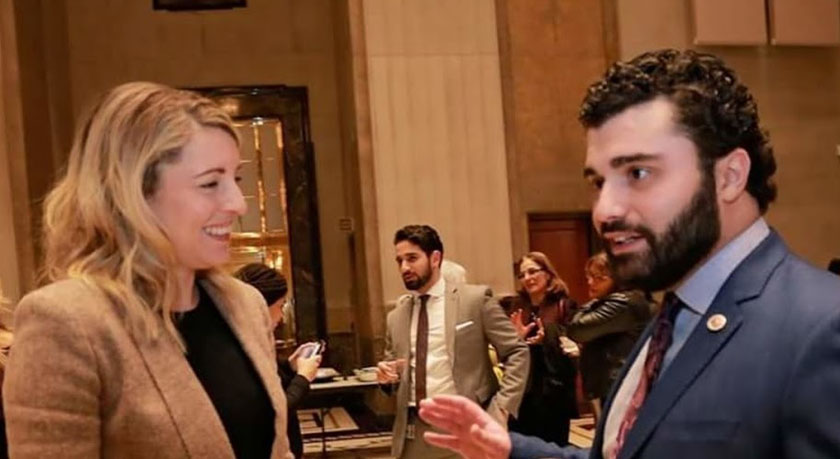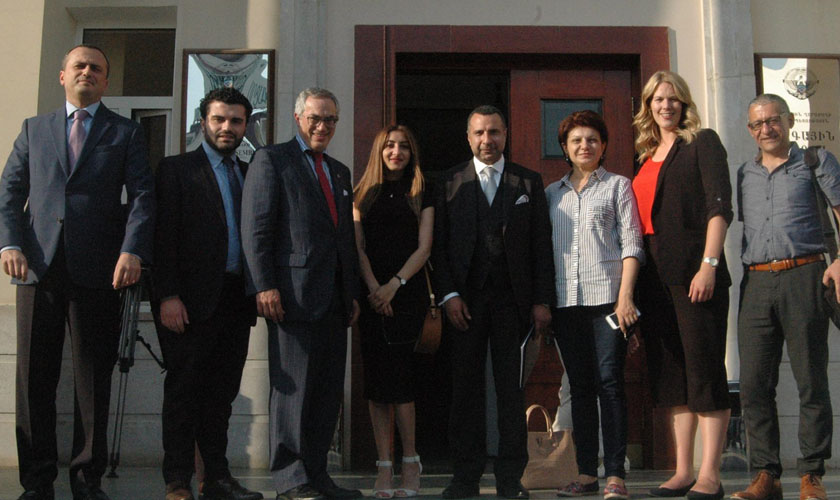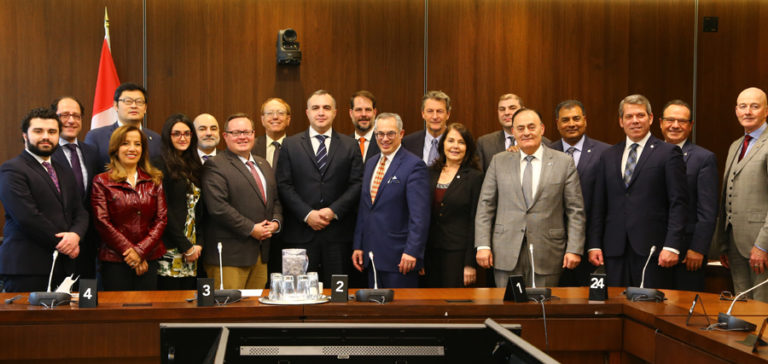Interview with Armenian National Committee of Canada (ANCC) executive director Sevag Belian

The ANCC has worked to represent the collective interest of our nation in Ottawa and across Canada
By Vahakn Karakachian
– The Armenian National committee of Canada (ANCC) is the largest Armenian grassroots organization in Canada. When was the ANCC established? What is its organizational structure?
The organized efforts of the Armenian-Canadian community to advocate for the rightful cause of the Armenian people started since the fist decade of the 20th century. Under the auspices of various ARF Committees across southern Ontario, Armenian activists undertook special initiatives that helped for the resettlement of refugees fleeing the Armenian genocide and for the organization of communities under the patronage of the Armenian church and various umbrella organizations such as the ARS, AYF, and the compatriotic unions. However, it wasn’t until 1918, when the Armenian National Committee of America was established to give a voice to Armenians throughout the political arena in North America. And in 1965, the ‘Armenian National Committee of Canada’ (ANCC) was established as a counterpart to the ANCA.
Today, the ANCC is the largest and most influential Armenian grassroots organization in Canada that operates across our vast nation. The ANCC works nationally, with particular emphasis on the federal legislative and executive bodies. Alongside the national office in Ottawa and the National Executive Board, local chapters operate in Montreal, Laval, Toronto, Cambridge, Hamilton, St. Catharines, Windsor, and Vancouver with an emphasis on provincial and municipal governments and bodies.
– One of the main issues of the diasporan Armenian communities in the western hemisphere is the recognition of the Armenian Genocide. Canada has recognized the Armenian Genocide. Please give us a brief chronological history of the recognition.
Canada is one of the many countries in the world that has officially recognized the Armenian Genocide. Canada is also one of the few countries that has recognized of the Armenian Genocide on all levels of its federal government. However, prior to the recognition from the legislative and executive bodies of the federal government, various provincial jurisdictions and municipal governments recognized and condemned the acts of 1915 as Genocide. On a provincial level, it started with two resolutions, passed by the Legislative Assembly of Ontario and the National Assembly of Quebec on March 27 and April 10, 1980, respectively. This was followed by an official proclamation on April 24, 1986, from the Premier of Ontario, David Peterson, proclaiming April 24th as ‘Armenian Memorial Day’, while the Quebec National Assembly passed a law on December 10, 2003, officially recognizing the Armenian Genocide. On April 3rd, 2006, the BC legislature passed a motion as well, officially recognizing the Armenian Genocide. Concurrent with the recognitions issued by the provincial governments, various municipalities across the nation issued similar declarations as well, notably, the City of Montreal and the City of Toronto.
On a federal level, the first motion recognizing the Armenian Genocide was passed on June 13, 2002 by the Canadian Senate, which was followed by the Motion-380, passed by the House of Commons, officially recognizing the Armenian Genocide and condemning it as a crime against humanity. However, official recognition from the Canadian Government did not come until April 2006, when Prime Minister Stephen Harper issued an official statement, making Canada’s stance on this matter clear to the international community. Since then, the Armenian-Canadian community has been grateful to successive Canadian governments for their unwavering commitment to this cause and their continuous reaffirmation of Canada’s recognition of the Armenian Genocide
Furthermore, on April 24 2015, the House of Commons passed a motion declaring the month of April as Genocide Remembrance, Condemnation and Prevention Month, and designated April 24th as ‘Armenian Genocide Memorial Day’. It is important to mention that in 2015, the Senate of Canada also reaffirmed its recognition of the Genocide.
– Tell us about your cooperation with other ethno-cultural communities and human rights organizations in Ottawa?
Since its inception in 1965, the ANCC has always prioritized its relations with various other ethnocultural communities and human rights organizations across Canada. To this day, the ANCC continues to maintain very strong ties with a number of communities and organizations that continues to strengthen in the spirit of friendship and cooperation.
Since the early days of our activism, we have worked with various communities and interest groups where the collective issues and concerns of various ethnocultural communities are raised and represented to government. Over the years, we have established lasting cooperation with a large number of communities across Canada an have worked in close partnership with various organizations from the Jewish, Ukrainian, Greek, Cypriot, Rwandan, Serbian, Kurdish, Assyrian and other communities as well. Together, we have worked and continue to work on various projects and initiatives that are reflective of our shared values and commitment to cultural diversity, inclusion, justice and human rights. Our close cooperation with some of the abovementioned communities for the adoption of Motion-587 on April 24, 2015? that recognized the month of April as Genocide Remembrance, Condemnation and Prevention Month? was a true testament of our collective work and responsibility to a shared history.
The ANCC is also proud of its partnership with different human rights organizations and educational institutions, specifically the Canadian Museum for Human Rights (CMHR) that is located in Winnipeg and funded by the Canadian Government. CMHR is a very important institution in our country that strives to create a more tolerant, respectful and inclusive Canadian society that is conscious of its own past and respects the rights and freedoms of other people.
The Armenian National Committee of Canada has been working with the Canadian Museum for Human Rights (CMHR) since its preparatory phases. ANCC activists have been in constant contact with the CMHR to include the Armenian Genocide and the Georgetown Boys in the genocide gallery and to collaborate with them on various educational activities across the country.
– On 29 August 2017, a humanitarian delegation from One Free World International, based in Toronto, Canada; traveled to the Republic of Artsakh on a 4-day fact-finding mission. Two Canadian lawmakers were part of this mission. What was the purpose of this mission?
From August 29 to September 1, 2017, a Canadian delegation headed by Rev. Majed el-Shafie, founder and president of One Free World International, and Members of Parliament the Hon. Tony Clement and Rachael Harder, both shadow ministers of the Conservative Party of Canada (CPC), visited the Republic of Armenia and undertook an unprecedented fact-finding mission to the Republic of Artsakh.
While there have been multiple visits by Canadian delegates to Artsakh in the past, this particular visit was special in its kind, considering that it was tasked by a specific fact-finding mission that aimed to study and reveal the gross human rights violations that were committed by Azerbaijan, during the Four-Day War in April 2016.
The delegation commenced its official agenda in Yerevan on August 29th, where they held several high-ranking meetings with Armenian officials from the legislative and executive branches. During the meetings with Armenia’s Foreign Affairs and Defence ministers, as well as the speaker of the National Assembly of Armenia, the sides discussed various issues pertaining to the expansion of bilateral relations between Canada and Armenia, regional developments, the ongoing peace process in the Artsakh conflict and the importance of protecting the self-determination of the people of Artsakh.
From August 30 to September 1st, the delegation was hosted by the Republic of Artsakh, where similar meetings were held with the President of the Republic of Artsakh, the speaker of the National Assembly and the ministers of Defence and Foreign Affairs. The delegation also visited the frontlines and the towns and villages that saw heavy destruction by the Azerbaijani army in April 2016, where they met with the servicemen that courageously defend the borders and the dignity and fundamental rights of the people of Artsakh.
Needles to say that shortly after their arrival in Artsakh, Rev. El-Shafie and the parliamentarians were subjected to slanderous attacks by the Azerbaijani Foreign Ministry, eventually being placed on Baku’s infamous ‘’blacklist’’. Meanwhile, Azerbaijani state media and public news agencies falsely accused the ANCC with defamatory accusations of sponsoring the trip of the delegation.
– What is the current mandate of the ANCC?
Working in coordination with a network of 8 chapters, an active grassroots community throughout Canada, and affiliated organizations around the world, the ANCC actively advances the concerns of the Armenian- Canadian community on a wide range of issues, including ongoing advocacy for the recognition of the Armenian Genocide, strengthening Canada-Armenia relations, ensuring the peace, prosperity and the right to self-determination for the people of Artsakh, a self-sustained and prosperous Javakhk and upholding human rights in Canada and other diasporan communities around the world .
We strive to generate public awareness about issues affecting the Armenian community in Canada and abroad, represent the collective Armenian-Canadian viewpoint on matters of public interest, support and promote human rights issues concerning Canadians and serve as a liaison between the community and their elected officials.
Along with specific issues concerning the Armenian-Canadian community in particular, our work is a reflection of our collective struggle as a nation. For decades, the ANCC has worked to represent the collective interest of our nation in Ottawa and across Canada, with particular emphasis on certain issues of top priority to our people.
Following the recognition of the Armenian Genocide (by the Senate, the House of Commons and the Canadian Government) and the declaration of ‘Armenian Genocide Remembrance Day’ on the 24th of April 2015, we now concentrate on the reparations file, countering the ongoing Turkish state-sponsored Genocide denial campaigns, expanding our efforts to further educate the general public about the events of 1915 and all other crimes against humanity, and ensuring the accurate representation of this matter within the media and political, social and educational circles.
After the independence of Armenia in 1991, the ANCC has been the primary organizations, working alongside other organizations and the Canada-Armenia Parliamentary Friendship Group, to advance the bilateral relations between Canada and Armenia. Today, the relations between our two countries are at a significantly high level, with close people-to-people ties, strong political cooperation and substantial economic and cultural exchanges.
Of course, a significant part of our work is focused on the current situation in the Republic of Artsakh. The ANCC and its affiliate organizations work tirelessly to make the accurate representations of the current situation and ensure Canada’s principled approach to the rights and freedoms of the people of Artsakh to live and prosper in a free and independent homeland. Our expectation from the Canadian Government is to continues its balanced approach towards the peaceful settlement of the conflict, through the framework of the OSCE Minsk Group, condemn all forms of aggression from Azerbaijan and advocate for the establishment of monitoring mechanisms along the line of contact. We also work with the government to encourage the participation of the Republic of Artsakh in the negotiation process, which is the only fair method to reach a viable settlement of the conflict.
– What about the Turkish and Azeri Lobbies, are they active in Canada?
The Turkish and Azeri community in Canada have various organizations that operate in different parts of the country and continue pressuring the Canadian government to revoke its decision on the Armenian Genocide, distort the truth on Artsakh and misrepresent the true facts of history. They spend significant amounts of money to counter our efforts that are carried in pursuit of our shared Canadian values of justice, tolerance and democracy.
The ANCC is highly vigilant to all the anti-Armenian activities that are carried out by these organizations and on multiple occasions, it has countered and will continue to counter any attempt that aims to alter the course of history and pervert the truth.





